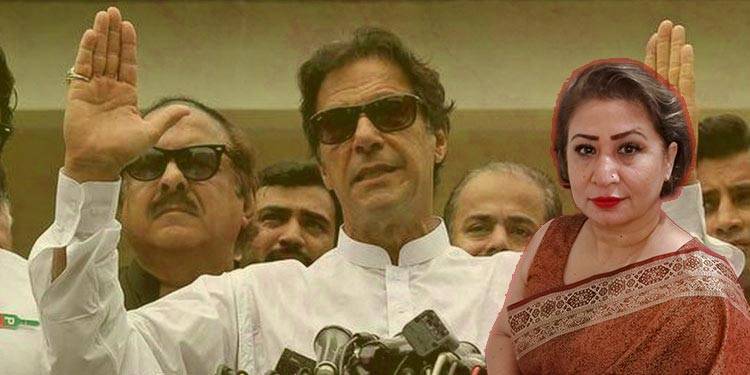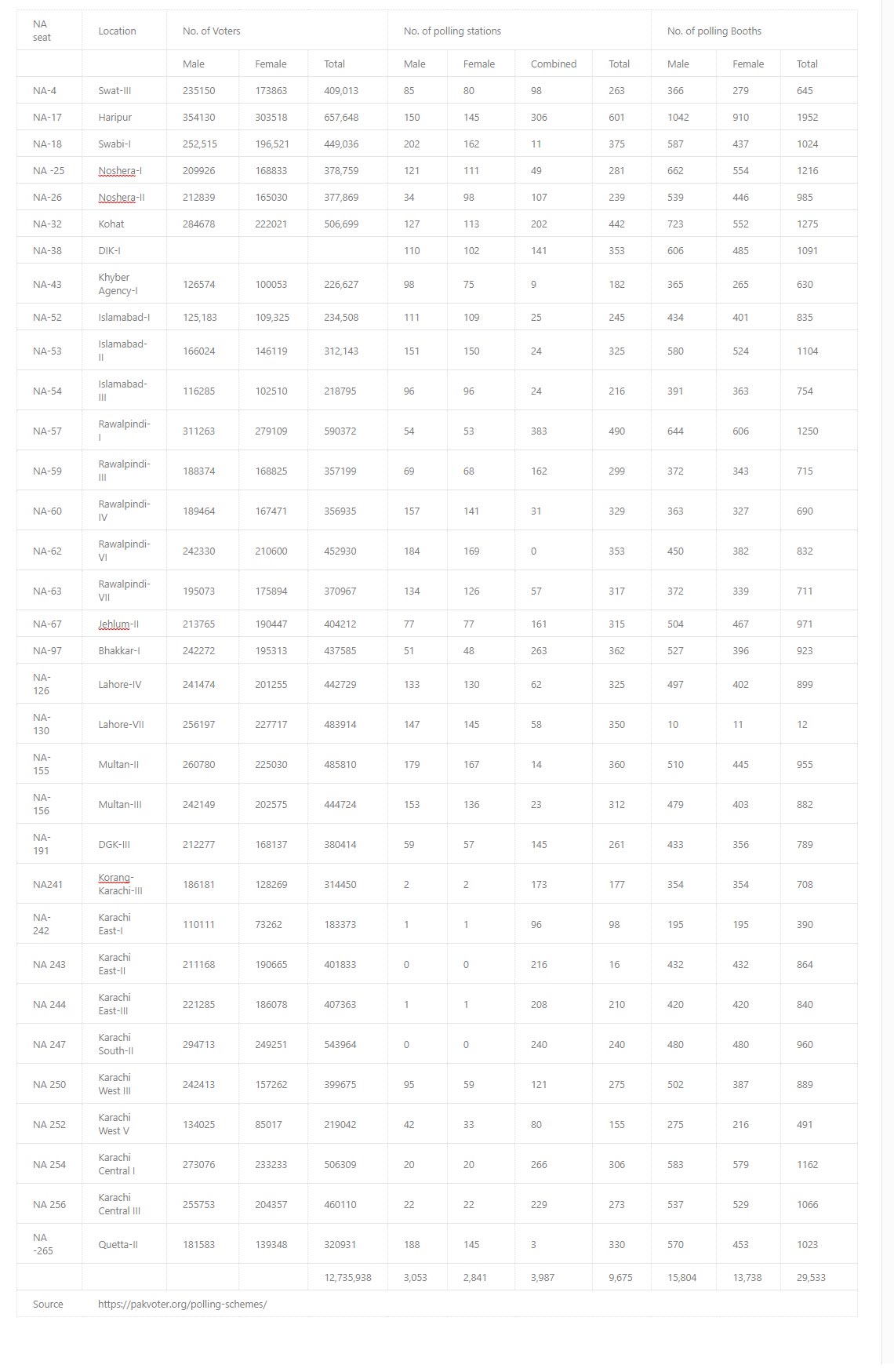
It’s people’s democratic right to select their political representatives through free and fair elections. Unfortunately, Imran Khan, Chairperson Pakistan Tehreek-e-Insaaf, has turned this right into a political joke. Khan has decided to contest by-elections on 33 National Assembly seats to be held on March 16, 2023. The Election Commission of Pakistan vacated these seats after the de-seating of PTI parliamentarians earlier this month.
The election act and rules do not put a bar on any candidate to context more than one constituency on national and/or provincial level. Political leaders have contested elections on more than one seat to protect themselves from any electoral upsets in the past. Khan made history in the by-elections of October 2022 by contesting seven National Assembly seats and winning six of them.
It is quite likely that in all 33 by-elections Imran Khan will sweep, especially since the Pakistan Democratic Movement (PDM) has announced not to contest the by-elections in March.
The political economy of PTI decision
The PTI decision will ridicule the electoral process, waste precious governmental resources, create an illusion of being the most powerful political candidate, and boost the party’s social media presence.
From another angle, it shows that there are no candidates that could guarantee a win for the PTI, and that prospective candidates are not ready to invest in election. Also, the large ATMs are not available to bear the burden of the chairman’s utopian wish.
The miscalculated political move of the dissolution of Khyber Pakhtunkhwa (KP) and Punjab assemblies has left the PTI devoid of political space and power to negotiate electoral reform for the next general elections. The PTI’s parliamentarians, including Khan, are blamed for not attending the National Assembly sessions. The support from the establishment to manage critical functions of the parliament could be the reason for their absence.
It was the party’s self-presumed political grandeur that led the leaders to announce the dissolution of KP and Punjab assemblies. The PDM played better politics and jettisoned the PTI move by calling for the KP and Punjab assemblies.
The cost to elections
The election entail assigning polling staff, setting up polling stations, acquiring polling material, ensuring security and more. Human resource requirements include one presiding officer, two assistant presiding officers and one polling officer per booth.
Based on information available from elections on these 33 seats in 2018, there were 9675 polling stations. Hence the by-polls will entail appointing about 9,675 presiding officers; 19,350 assistant presiding officers, 29,533 polling officers and a total of 48,883 polling staff. Add to this the number of police staff required at the polling booths: a minimum of two per booth which means 59,066 in total. The sensitive polling stations may need more security. The police deployed to maintain law and order during election campaign will increase the number of required police staff.
The ECP is likely to spend approximately Rs 1.43m per polling station, which when multiplied with 9675 polling stations per NA constituency sums up to Rs 13.84 billion.
The cost to run elections are capped at Rs 4 million per NA candidate, which if multiplied by 33 seats of by-elections would sum up to Rs 132 million.
This is even more complicated because each candidate is required to open a bank account for every constituency. So, in Khan’s case, he will have to open 33 bank accounts and provide details of campaign expenditure for each of those constituencies. Khan’s party will have to designate one polling agent per candidate per booth, approximately 29,533 persons. Now, why would the PTI waste such substantial resources of the party?
Beside, the provincial government will have to spend on the maintenance of law and order and on duties to ensure conduct of activities as per the election schedule.
Gains and losses
The financial losses aside, by contesting the by-elections the PTI will affirm faith in the existing political system. The speaker will administer the newly elected members’ oath. Would that not legitimize the party’s faith in the existing system? And since Imran Khan's 33 by-elections will return only one candidate from the party, the system has already become a joke.
The by-elections will guarantee zero benefit of electorates, as the PTI will not hold any seat in this futile exercise. Even if the PTI holds one seat it means that out of 12,735,938 voters in 33 constituencies – an average of 385,938 per constituency – 12,350,000 will be denied their right to be represented in the electoral process.
It’s high time the political leaders think beyond their personal egos. The country needs an economic solution which is linked to its political stability. There will be more opportunity to play the dirty game of politics but for now let’s think about the good of Pakistan.

The election act and rules do not put a bar on any candidate to context more than one constituency on national and/or provincial level. Political leaders have contested elections on more than one seat to protect themselves from any electoral upsets in the past. Khan made history in the by-elections of October 2022 by contesting seven National Assembly seats and winning six of them.
It is quite likely that in all 33 by-elections Imran Khan will sweep, especially since the Pakistan Democratic Movement (PDM) has announced not to contest the by-elections in March.
The ECP is likely to spend approximately Rs 1.43m per polling station, which when multiplied with 9675 polling stations per NA constituency sums up to Rs 13.84 billion.
The political economy of PTI decision
The PTI decision will ridicule the electoral process, waste precious governmental resources, create an illusion of being the most powerful political candidate, and boost the party’s social media presence.
From another angle, it shows that there are no candidates that could guarantee a win for the PTI, and that prospective candidates are not ready to invest in election. Also, the large ATMs are not available to bear the burden of the chairman’s utopian wish.
The miscalculated political move of the dissolution of Khyber Pakhtunkhwa (KP) and Punjab assemblies has left the PTI devoid of political space and power to negotiate electoral reform for the next general elections. The PTI’s parliamentarians, including Khan, are blamed for not attending the National Assembly sessions. The support from the establishment to manage critical functions of the parliament could be the reason for their absence.
It was the party’s self-presumed political grandeur that led the leaders to announce the dissolution of KP and Punjab assemblies. The PDM played better politics and jettisoned the PTI move by calling for the KP and Punjab assemblies.
The cost to elections
The election entail assigning polling staff, setting up polling stations, acquiring polling material, ensuring security and more. Human resource requirements include one presiding officer, two assistant presiding officers and one polling officer per booth.
Based on information available from elections on these 33 seats in 2018, there were 9675 polling stations. Hence the by-polls will entail appointing about 9,675 presiding officers; 19,350 assistant presiding officers, 29,533 polling officers and a total of 48,883 polling staff. Add to this the number of police staff required at the polling booths: a minimum of two per booth which means 59,066 in total. The sensitive polling stations may need more security. The police deployed to maintain law and order during election campaign will increase the number of required police staff.
The ECP is likely to spend approximately Rs 1.43m per polling station, which when multiplied with 9675 polling stations per NA constituency sums up to Rs 13.84 billion.
The cost to run elections are capped at Rs 4 million per NA candidate, which if multiplied by 33 seats of by-elections would sum up to Rs 132 million.
This is even more complicated because each candidate is required to open a bank account for every constituency. So, in Khan’s case, he will have to open 33 bank accounts and provide details of campaign expenditure for each of those constituencies. Khan’s party will have to designate one polling agent per candidate per booth, approximately 29,533 persons. Now, why would the PTI waste such substantial resources of the party?
The cost to run elections are capped at Rs 4 million per NA candidate, which if multiplied by 33 seats of by-elections would sum up to Rs 132 million.
Beside, the provincial government will have to spend on the maintenance of law and order and on duties to ensure conduct of activities as per the election schedule.
Gains and losses
The financial losses aside, by contesting the by-elections the PTI will affirm faith in the existing political system. The speaker will administer the newly elected members’ oath. Would that not legitimize the party’s faith in the existing system? And since Imran Khan's 33 by-elections will return only one candidate from the party, the system has already become a joke.
The by-elections will guarantee zero benefit of electorates, as the PTI will not hold any seat in this futile exercise. Even if the PTI holds one seat it means that out of 12,735,938 voters in 33 constituencies – an average of 385,938 per constituency – 12,350,000 will be denied their right to be represented in the electoral process.
It’s high time the political leaders think beyond their personal egos. The country needs an economic solution which is linked to its political stability. There will be more opportunity to play the dirty game of politics but for now let’s think about the good of Pakistan.


